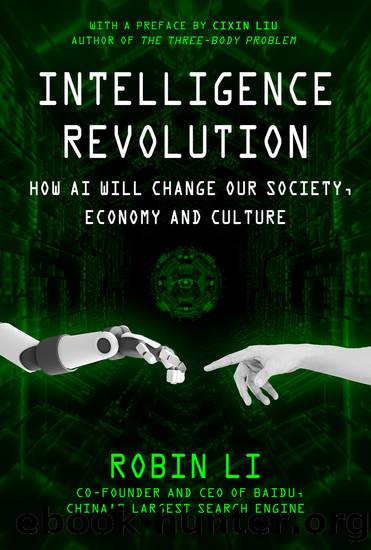Artificial Intelligence Revolution by robin Li

Author:robin Li
Language: eng
Format: epub
ISBN: 9781510753006
Publisher: Skyhorse
Published: 2020-09-04T00:00:00+00:00
6
RUSHING INTO NO-MANâS LAND OF AI: THE ROAD TO THE UNMANNED VEHICLE
Artificial intelligence can only reflect the revolutionary significance of technology if it is closely linked to the fate of mankind and confronts complex situations. Milan Kundera said, âThe heavier the burden, the closer our lives come to the earth, the more real and truthful they become.â Unmanned vehicles are the chief artificial-intelligence project that clings to the earth. âDifficultâ and âsubversiveâ are two adjectives that the concept must overcome. Unmanned vehicles were born before artificial intelligence, but they face more hurdles before they can exist in a meaningful way. The rut left behind them will be the social order since the birth of transportation.
An unmanned vehicle, also called an autonomous vehicle, is a car that senses the environment and navigates without human intervention. When the first unmanned vehicle was on the road in the United States in 1925, the inventors had not reached a consensus on whether it needed to be smart. But since then, the image of unmanned vehicles has appeared in different kinds of science fiction and movies. This dream is so specific, but after several generations it has not come true yet. Fortunately, the frustration of every dreamer makes the road of unmanned vehicles easier; this is a road to intelligent evolution and a road of change for human society.
In the future, unmanned vehicles will no longer be just transport tools; they will also be a third space outside the home and office, which is mobile, safe, and comfortable. People will move in space at the lowest cost. Traffic jams, pollution, and difficult parking caused by inefficiency will be greatly alleviated. Driving behaviors that endanger the safety of others, such as drunk driving, driving through red lights, and speeding will no longer exist. The unmanned vehicle system will likely become the blood vessel of the global Internet of things system, and even the social status and symbolic meaning of cars as a mode of transportation will be completely changed.
According to the World Health Organization, in 2015, more than 260,000 people were killed in traffic accidents every year in China, which ranks first in the worldâabout 90 percent are caused by human error. Unmanned vehicles are expected to reduce the number of accidents down to 1 percent of the current level.
There are also huge gains. In a report, Morgan Stanley pointed out that after the development of unmanned vehicles, the United States can earn $1.3 trillion in revenue, which is equivalent to 8 percent of US GDP. More than $100 billion will come from fuel savings, more than $200 billion from reduced traffic jams, more than $500 billion from medical and insurance costs by reduced traffic accidents, and more than $400 billion from higher work efficiency.
But thereâs more. Once smart tools connect cars and cars, people and people, and people and society, they will reshape the rules of the material world.
Download
This site does not store any files on its server. We only index and link to content provided by other sites. Please contact the content providers to delete copyright contents if any and email us, we'll remove relevant links or contents immediately.
Algorithms of the Intelligent Web by Haralambos Marmanis;Dmitry Babenko(17650)
Jquery UI in Action : Master the concepts Of Jquery UI: A Step By Step Approach by ANMOL GOYAL(10069)
Test-Driven Development with Java by Alan Mellor(7752)
Data Augmentation with Python by Duc Haba(7626)
Principles of Data Fabric by Sonia Mezzetta(7402)
Learn Blender Simulations the Right Way by Stephen Pearson(7308)
Microservices with Spring Boot 3 and Spring Cloud by Magnus Larsson(7156)
Hadoop in Practice by Alex Holmes(6701)
RPA Solution Architect's Handbook by Sachin Sahgal(6533)
The Infinite Retina by Robert Scoble Irena Cronin(6239)
Big Data Analysis with Python by Ivan Marin(5959)
Life 3.0: Being Human in the Age of Artificial Intelligence by Tegmark Max(5541)
Pretrain Vision and Large Language Models in Python by Emily Webber(4915)
Infrastructure as Code for Beginners by Russ McKendrick(4676)
Functional Programming in JavaScript by Mantyla Dan(4512)
WordPress Plugin Development Cookbook by Yannick Lefebvre(4411)
The Age of Surveillance Capitalism by Shoshana Zuboff(4273)
Embracing Microservices Design by Ovais Mehboob Ahmed Khan Nabil Siddiqui and Timothy Oleson(4167)
Applied Machine Learning for Healthcare and Life Sciences Using AWS by Ujjwal Ratan(4156)
